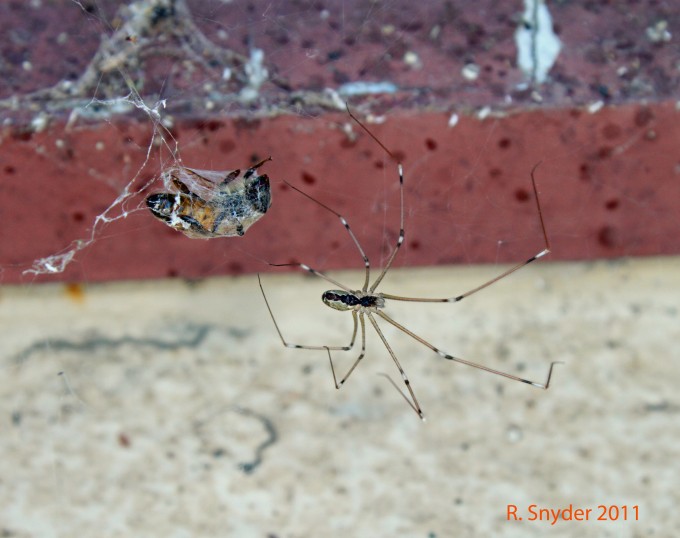
The terrible decline of bees is a frequent topic here, but today I’ll set aside my usual complaints about the 40% losses of the bee population due to pollution, paving and the overuse of pesticides by humans. Bees are a part of the natural world; the world of nature which includes a give and take with other beings who need food. Bees, like the majority of Earth’s creatures suffer during the winter; and, food pressures during late winter and early spring are the most intense.
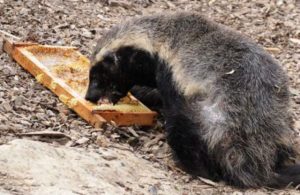 When food is scarce, skunks, woodpeckers, badgers, raccoons, mice and opossums will prey on bees.The bees themselves are nutritious, the spring brood is loaded with protein and the honey is a wonderful winter treat. When the ground is frozen, a woodpecker will drill a hole in the bee box to get at the bees and honey. Some predators like the badger or the fox will knock over the bee hive and feast. Skunks and raccoons will scratch on the hive and as bees emerge to defend the hive, they eat the bees. There are toads and frogs that sit on the hive entrance and eat bees as they leave the hive.
When food is scarce, skunks, woodpeckers, badgers, raccoons, mice and opossums will prey on bees.The bees themselves are nutritious, the spring brood is loaded with protein and the honey is a wonderful winter treat. When the ground is frozen, a woodpecker will drill a hole in the bee box to get at the bees and honey. Some predators like the badger or the fox will knock over the bee hive and feast. Skunks and raccoons will scratch on the hive and as bees emerge to defend the hive, they eat the bees. There are toads and frogs that sit on the hive entrance and eat bees as they leave the hive. 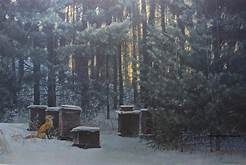 Beekeepers will strap hives closed and some use electric fencing; my dogs protect my hives from these predators.
Beekeepers will strap hives closed and some use electric fencing; my dogs protect my hives from these predators.
Other insects eat bees too. Wasps are very thorough and can wipe out a hive in a few days. They eat the honey, the brood and the bees. link Yellow jackets, mites, spiders all like a bee for dinner. Of course, the bees defend the nest. My africanized bees have defended themselves from the dreaded Varona mite, and from wasps so far.
When winter begins, bees will have stored up as much h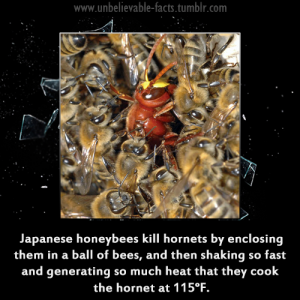 oney as possible to make it through the winter. When the cold hits, the workers envelope the queen in what is called cluster. The bees then “shiver” moving their wings rapidly. This warms the hive. The temperature range in the hive can be as low as the 40’s near the exterior to a high, typically of 80 degrees, at the center of the cluster. To expend all this energy the bees must have plenty of honey. If they run out of honey the hive dies.
oney as possible to make it through the winter. When the cold hits, the workers envelope the queen in what is called cluster. The bees then “shiver” moving their wings rapidly. This warms the hive. The temperature range in the hive can be as low as the 40’s near the exterior to a high, typically of 80 degrees, at the center of the cluster. To expend all this energy the bees must have plenty of honey. If they run out of honey the hive dies.
Winter losses of bees average 10 to 15% and bad conditions can cause a beekeeper losses of closer to 100%. For example, in a year of drought, it’s hard for bees to store enough honey to last a winter. My beekeeper came last Sunday to check my hives and she said my bees had plenty of honey to last the res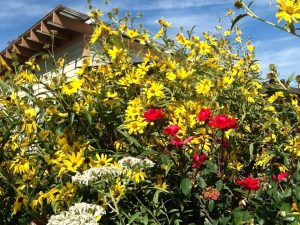 t of winter. She had inspected hives that were in trouble and that would need sugar supplements to make it through. I was thrilled of course and glad the MacMillan Sunflowers and the White Wood Asters had done so well last fall. Both plants are covered with bees for weeks.
t of winter. She had inspected hives that were in trouble and that would need sugar supplements to make it through. I was thrilled of course and glad the MacMillan Sunflowers and the White Wood Asters had done so well last fall. Both plants are covered with bees for weeks.